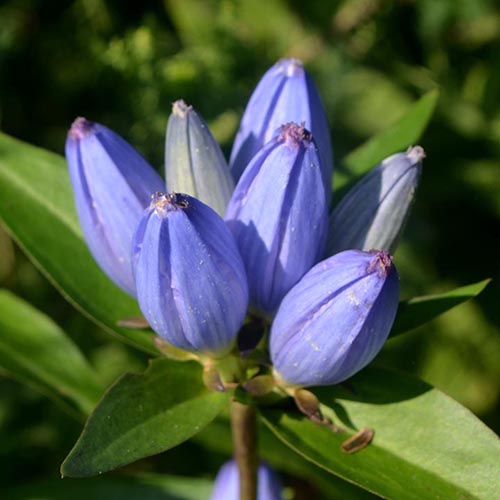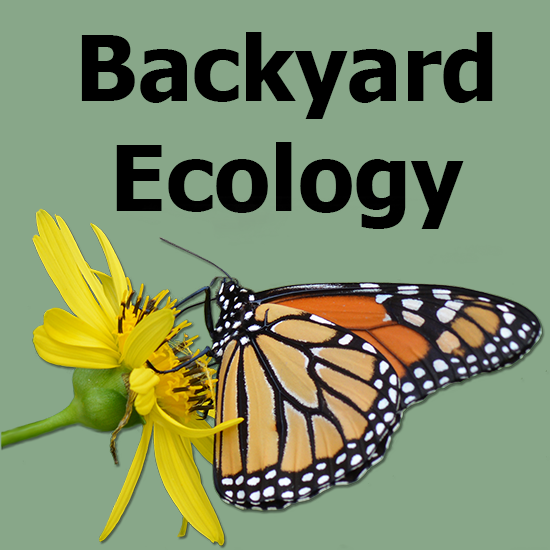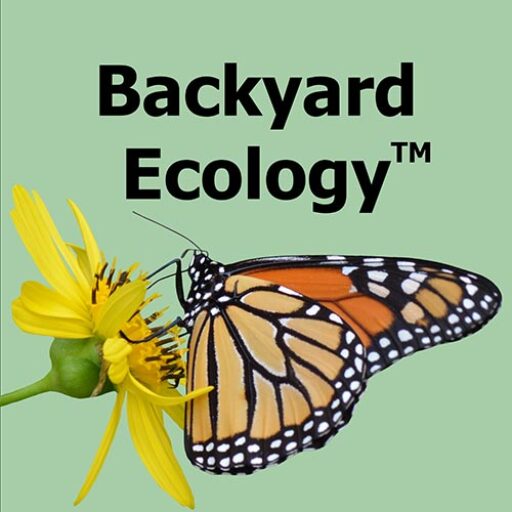
Listen to this Episode:
- From this webpage:
- Find the media player located under the episode picture.
- Click on the green triangle to listen to the audio for this episode.
- From your favorite podcast listening platform:
- Search for “Backyard Ecology.”
Show notes:
You know how sometimes you’ll meet someone and things just “click?” You quickly discover that you have lots of shared interests and experiences and your conversation just flows as it goes down one path and then the next.
Well, that’s exactly what happened in this episode as I talked with Dr. Randi Eckel. Randi is the owner of Toadshade Wildflower Farm which is a mail-order native plant nursery. She is a life-long naturalist, lover of nature, entomologist, and confirmed plant and ecology nerd. Randi is also the president of the Native Plant Society of New Jersey.
Growing native plants and interactions between plants and insects were two of the major themes of our conversation, but our conversation also went down many other twisty, curvy paths. This was one of those conversations that could so easily have occurred sitting on the front porch or around a campfire. I hope you enjoy listening to it as much as I enjoyed recording it.
[2:47] Randi’s story of how she got to where she is now and discussion of career paths
[7:01] Changes Randi has seen in the native plant industry over the years and importance of plants that are native to your region
[12:05] How even small properties, balconies, and rooftop gardens can make a huge difference for pollinators and songbirds
[15:26] Pond stories from our childhoods, college classes, and connections with native plants and animals
[19:05] Recommendations for getting started with native plants
[24:25] Tackling weeds and invasive species
[26:36] Combating invasive species with native species
[30:25] Importance of native plant diversity and examples of pollinator interactions
[33:39] Violets and the great spangled fritillary
[35:49] Why are flowers in the yard a bad thing?
[37:20] Using water features to attract wildlife and stories of observations we’ve made on our properties
[42:09] Mothing and watching moths visit light colored flowers in the evening
[43:01] Vernal pools, rain gardens, and sump pump gardens
[45:33] Great diversity of native plants that can be found in any given region and how embracing that can be freeing
[46:56] White turtlehead, Baltimore checkerspot butterfly, and importance of wildlife corridors and habitat stepping stones
[48:32] Importance of year-round habitat for butterflies and other insects and easy ways to provide that year-round habitat
[53:11] Discussion about the importance of thinking about things, drawing connections, and learning about the interactions between plants, insects, and wildlife
[55:13] What to look for if mail ordering native plants or seeds
[1:00:24] Native plant poaching and its impacts
[1:02:29] Check out a native plant society near you
If you find value in the Backyard Ecology content, please consider making a one-time or monthly donation. You can find out how at https://www.backyardecology.net/support /.
Until next week, I encourage you to take some time to explore the nature in your own yard and community.
Randi’s Information:
- Email: randi@toadshade.com
- Toadshade Wildflower Farm website: https://www.toadshade.com/
- Toadshade Wildflower Farm Facebook page: https://www.facebook.com/ToadshadeWildflowerFarm
- Randi’s blog: https://www.toadshade.com/blogarchive.html
- Randi’s article about brush piles: https://www.toadshade.com/randiblognov18.html
Other Resources Mentioned:
- The Native Plant Society of New Jersey: https://npsnj.org/
Related Backyard Ecology Resources:
- What? Barred Owls Catch and Eat Frogs?!: https://www.youtube.com/watch?v=lVll7OwIQKo
- More than a Mud Puddle: The Exciting World of Vernal Pools: https://www.backyardecology.net/more-than-a-mud-puddle-the-exciting-world-of-vernal-pools/
- Try Mothing – Attracting and observing moths: https://www.backyardecology.net/try-mothing-attracting-and-observing-moths/
- Create a Brush Pile: https://www.backyardecology.net/create-a-brush-pile/
- Great Spangled Fritillary: https://www.backyardecology.net/great-spangled-fritillary/
- Common Blue Violet: https://www.backyardecology.net/common-blue-violet/
- Springbeauty: https://www.backyardecology.net/springbeauty/
General Backyard Ecology Links:
- Website: https://backyardecology.net
- YouTube Channel: https://www.youtube.com/backyardecology
- Blog: https://www.backyardecology.net/blog/
- Patreon page: https://www.patreon.com/backyardecology
- Make a one-time donation: https://www.paypal.com/biz/fund?id=K7F3HJLJT9F8N
- Subscribe to Backyard Ecology emails: https://www.backyardecology.net/subscribe/
Episode image:
- Closed bottle gentian (Gentiana andrewsii) in bloom
- Photo credit: Evan Barker, CC-0

Backyard Ecology: Exploring Nature in Your Backyard
Nature isn’t just “out there.” It’s all around us, including right outside our doors. Hi, my name is Shannon Trimboli, and I am the host of Backyard Ecology. I live in southcentral Kentucky and am a wildlife biologist, educator, author, beekeeper, and owner of a nursery specializing in plants for pollinators and wildlife conservation. I invite you to join me as we ignite our curiosity and natural wonder, explore our yards and communities, and improve our local pollinator and wildlife habitat. Learn more or subscribe to my email list at www.backyardecology.net.

Leave a Reply